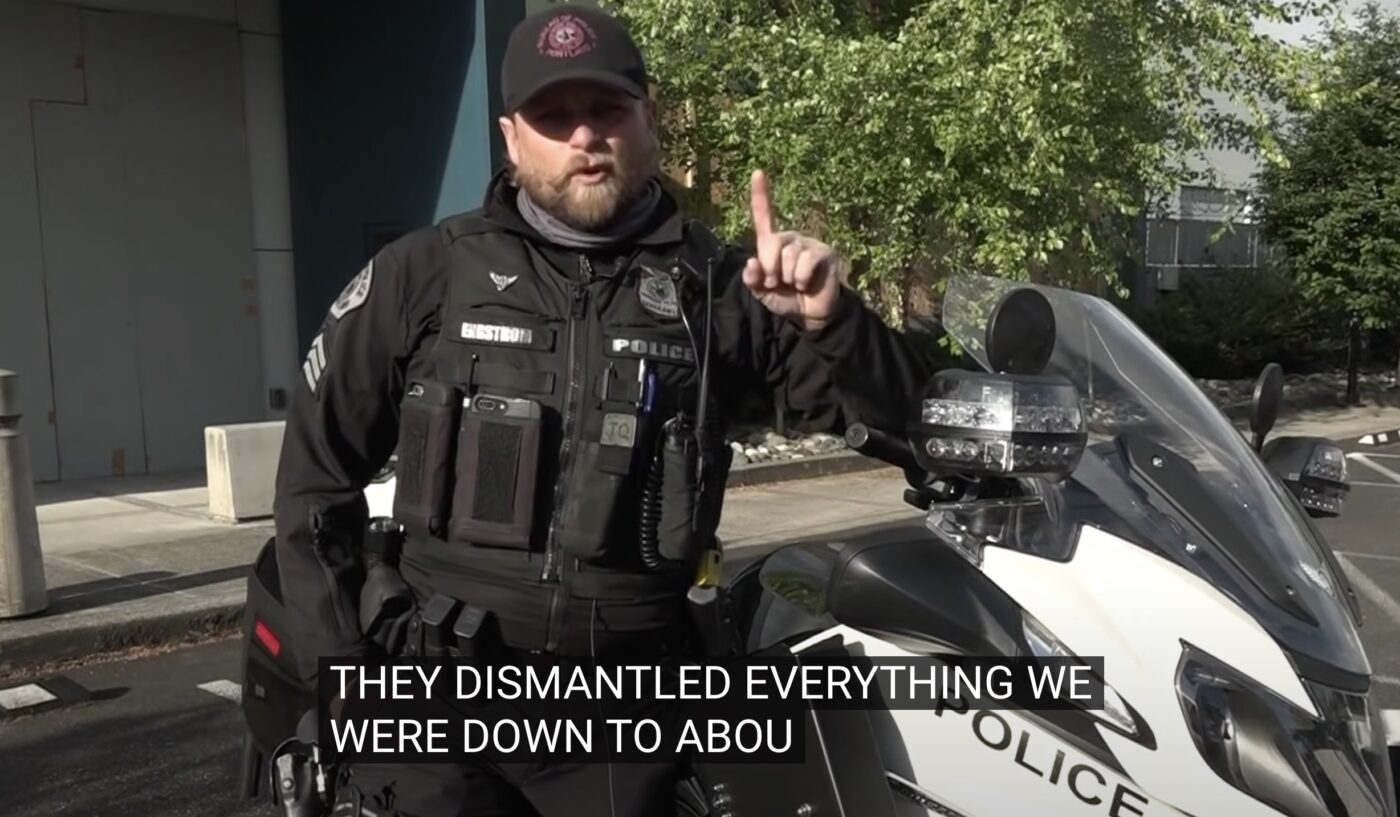
Something the Portland Police Bureau did in 2021 has bothered me ever since. At a press conference yesterday I was able to confirm my concerns about what happened with the officer directly involved.
On November 30th, 2021 a veteran member of the PPB’s Traffic Division, Sergeant Ty Engstrom, told the media that there was just one traffic enforcement officer to cover the entire city. The press conference organized by the PPB was ostensibly about a tragic rise in traffic deaths, but Sgt. Engstrom was also there to cement a narrative: He wanted Portlanders to link “defund police” with “traffic deaths” in order to receive more city funding.
His decision to place political goals of the bureau ahead of public safety led to the widespread perception that Portland had very little, to no traffic enforcement. I mentioned this briefly in my recap of yesterday’s press conference and didn’t plan to write a separate story about it until my tweet about an exchange I had with Sgt. Engstrom yesterday was widely shared. So now I want to share more context to help clarify what happened and why I think it’s important.
In addition to lawlessness and deaths on our streets and protests over policing and race, the context of that November 2021 press conference included a very contentious relationship between the PPB and former City Commissioner Jo Ann Hardesty. Hardesty wanted to “rethink police accountability” and at one point she filed a lawsuit against them.
In June 2020, Hardesty helped pushed through a $15 million PPB budget cut, and sought to cut even more later that year. The PPB (and the union that represents officers) responded by first warning, and then following-through (in December 2020), on a reorganization plan that pulled all but one officer — Sgt. Engstrom — out of the Traffic Division. Chief Chuck Lovell said he made the move because he was under-staffed and needed officers on general patrol.
While the PPB and others framed the move as a response to the “defund police” movement, Hardesty countered that it was solely Chief Lovell’s decision and that all officers could still enforce traffic laws if they wanted to.
That next summer, the PPB began to willingly tell the media that the Traffic Division had been “dismantled” and that Sgt. Engstrom was Portland’s sole traffic enforcement officer. In July 2021, Sgt. Engstrom told KGW that, “We’re down to one motorcycle, full-time.” That was down from 19 motorcycles on the Traffic Division, “before they dismantled everything,” he said.
The PPB doubled-down on that messaging a few months later and called a press conference on November 30th to lay it out clearly.
The bureau tapped Sgt. Engstrom to lead the event. After describing the terrible number of traffic deaths that year, Engstrom said, “It’s hard to ignore the fact that we have a record-setting number of fatalities and we have very, very low numbers of police officers patrolling our streets.”
“Beginning in 2021, staffing levels were so low they had to dismantle almost the entire Traffic Division,” he continued. “So I am the only full-time unit in the entire Portland Police Bureau… They do not have enough people to help them out to patrol your streets safely.”
When I first heard that I was shocked. Why on earth would someone sworn to public safety willingly broadcast that there’s no one enforcing traffic laws? Amid a spate of deaths and rampant speeding and dangerous driving, why would the PPB want drivers to know they can do whatever they want and likely not face any consequences? It seemed incredibly irresponsible.
“Portland is down to one full-time traffic officer as speeding tickets plummet,” said one local headline after the press conference.
As dangerous driving and deaths continued, I didn’t forget that press conference. In a December 2022 op-ed (written after yet another spike in traffic deaths), I called it “part of an ongoing campaign to set a narrative that results in PPB getting more funding and more officers,” and I warned the community that, “true or not, it is based on a political goal, not a safety goal.”
Ultimately the PPB received more funding, and in May 2023, they re-launched the Traffic Division. At the press conference where they made that announcement, I asked Sgt. Engstrom if he thought his press conference in 2021 had an impact on driving behaviors. “Some of it is, people just think they’re not going to get caught,” he acknowledged. “So yeah, absolutely, I think that all played a role.”
I didn’t plan to ask him about it again at Monday morning’s press conference. But when I asked him to name one concrete thing the PPB will do differently in the short-term to make streets safer and he said, “what we’re doing right now… is trying to be as visible as possible… to just try and make ourselves look bigger than perhaps we really are,” it struck me as the exact opposite tactic they deployed in 2021.
“So you’re puffing out a little bit, saying ‘Hey there’s a lot of us’ in order to make people afraid?” I said to Sgt. Engstrom, “Which is, you know, the opposite of what you did at that press conference when you said ‘There’s no traffic officers out there.’ That’s a very different thing.”
Then Engstrom interjected:
“We needed to create a stir to get some change, to get them [city council] to fund us back up. And I mean, that’s the honest truth. I know, that could make things more dangerous. I don’t know. But at the same time, we needed some change.”
The audio clip of our exchange is below:
The PPB made a decision to tell Portlanders and the media that no one was enforcing traffic laws (also during that time they would routinely tell people who called with concerns about speeding and other issues that they couldn’t address them because the Traffic Division had been “entirely defunded”). They also seemed to know that there was a risk it could lead to more dangerous driving. And they did it anyways. More than once.
Sgt. Engstrom’s comments spread through our community like wildfire. It was one of the rare government communications campaigns that actually worked. Unfortunately, what is good for PPB politics is not necessarily good for Portland.
Last month 13 people died in traffic crashes. 16 of the last 20 deaths involved someone committing a crime (either DUI and/or speeding).
If the PPB feels that fewer officers lead to more crashes and deaths, why would make that fact the main part of their traffic safety messaging? Now we know.



